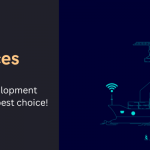
Custom Logistics IoT Development Services: 8 Main Facts and Pros
Logistics management includes numerous activities like inventory control, warehousing, transportation, supply chain administration, and more. Supervising all these processes may be challenging, especially if you do it manually. Yet, the industry is evolving by adopting innovations with the Internet of Things among them.
According to BlueWeave Consulting, the logistics IoT is expanding by 14% annually. The market will surpass $93 billion in 2028, increasing from over $37 billion in 2021. Thriving eCommerce, rapid digitization, and smart cities add to this growth.
But why use IoT for logistics in the first place? Read on to learn about the benefits of the Internet of Things for this industry. Learn about logistics IoT implementation, challenges, and services as well.
IoT Logistics Implementation: Process and Challenges
Implementation of IoT solutions for logistics involves using IoT sensors and devices to obtain real-time data on various logistics processes. It also allows you to automate and streamline most of the transportation-related tasks.
It can be efficient fleet management due to driver tracking, optimal route planning due to weather and road conditions checking, or warehouse management due to smart asset tracking and remote video surveillance.
IoT logistics adoption includes the following stages:
- Integrating IoT devices into specific working environments: warehouse, fleet, etc.
- Ensuring data collection by embedded IoT devices
- Processing the collected data and sending it to the cloud
- Creating specific logistics software that will help analyze the collected data
It may seem that implementing IoT logistics solutions is an effortless task, judging only by the steps we have described above. However, it’s a more complex process. Before adopting IoT, look at the challenges you could potentially face.
- Data security. IoT involves the collection and use of large amounts of data. You need to take care of reliable storage and ensure a robust architecture of your software to avoid any risks, such as data leakage or cyberattacks.
- Connectivity issues. The IoT devices and software’s proper operation largely depends on Internet connection stability. Since cargo transportation often occurs in regions with poor signal coverage, it can disrupt logistics processes.
- High implementation costs. Although IoT helps to reduce operational expenses significantly, implementing this technology can be somewhat costly. Nevertheless, it pays off in the long run.
- Necessary expertise. Building IoT software and integrating IoT devices require a high level of knowledge and skills that the average developer may not have. Therefore, it may be challenging to find suitable specialists.
Now, you are ready for the potential obstacles to using IoT in logistics. Nevertheless, implementing this tech will bring you much more benefits than challenges.
Internet of Things Logistics: Pros and Opportunities
The pros of IoT transportation and logistics solutions outweigh the industry-related bottlenecks. Need some proof? Learn about the top eight advantages of Internet of Things adoption.
1. Better Supply Chain Management
Smart logistics IoT enables companies to track data across the supply chain. These are things like how long it takes to sell products, which suppliers have better results, or how to streamline deliveries. By analyzing data, businesses can manage their supply chain more effectively.
2. Real-Time Vehicle Tracking
IoT smart transportation allows you to track the location of each vehicle in your fleet. Plus, it lets you collect traffic and weather data to plan the best routes for drivers. By implementing sensors, you can also monitor other indicators, such as air temperature in the truck, for proper cargo transportation.
3. Lower Shipping Costs
As IoT enables the automation of order processing, companies can reduce the number of workers responsible for this task. It significantly reduces shipping costs, just like Amazon robotics IoT development team has done with its autonomous last-mile delivery bots.
4. Increased Workplace Safety
Smart logistics using IoT devices helps to increase the level of safety in the workplace. For example, thanks to sensors, you can protect workers in the warehouse from various types of exposure or inform drivers about compliance with traffic rules.
5. Better Transportation Conditions and Product Safety
Custom IoT software also often allows the implementation of anti-theft capabilities. It is possible due to intrusion detection sensors, real-time product tracking, alarm systems, etc. Such solutions make cargo more visible and transportation safer.
6. Enhanced Reporting, Data Collection, and Analysis
The Internet of Things enables the efficient collection of large amounts of data. The analysis and reporting functions of the IoT software will allow IoT logistics companies to derive valuable insights for better business decisions.
7. Reduced Failed Delivery Risks
IoT devices help track every process in the supply chain. Therefore, companies can mitigate risks like missing cargo or shipping delays to ensure the timely delivery of goods.
8. Improved Inventory Management
IoT-enabled technology allows for timely re-stocking and distribution of goods. It’s possible owing to gathering data from sensors placed on products. This way, managers can track the goods’ location and ensure safe storage.
Core Logistics IoT Development Services
You have various options to improve your logistics processes by implementing IoT. Consider the following smart logistics services custom development:
Custom Logistics IoT Software Development
This service involves hiring logistics IoT engineers to build software from scratch. The experts will implement specific features according to your business needs.
Logistics IoT Data Management and Analytics
IoT developers can assist in delivering data collection and analytics software. Such experts will build robust platforms capable of handling large amounts of data.
Logistics IoT Legacy Software Improvement
If you already have logistics IoT software and want to improve it, this service may come in handy. Experienced IoT developers will implement new functionalities, enhance the performance of your platform, and implement any updates according to your requirements.
Logistics IoT Devices Development and Implementation
You can access expert help to create and integrate various IoT devices and sensors into your business processes. IoT developers will also streamline data transfer from hardware to software.
Logistics IoT User App Development
Logistics managers require convenient, user-friendly software. That is why you may require such a service. It involves developing and designing an intuitive app for end users.
Logistics Cloud Solutions Development
You can engage logistics IoT developers to secure data transfer from IoT devices to the cloud. These experts will also ensure data storage.
Logistics IoT Development Consulting
IoT development consulting is a service that involves planning your IoT software architecture and devising IoT devices implementation strategy. You can contact these experts to prepare for the Internet of Things adoption.
The cost of the above services will differ in various countries.
- For example, the median annual salary of the IoT developer in the US is $125,000, with the lowest rate of $102,500 and the highest being $160,000, which is quite expensive.
- You can expect to pay less for logistics IoT development in Germany, with a median annual salary of $83,248. You can find even more affordable experts for as much as $70,729.
- You may locate the most cost-effective services in Ukraine. Here, the average IoT developer’s annual rate is about $38,182.
Main Applications of IoT in Logistics
Today we discussed a lot of logistics IoT development services and benefits. But what software solutions can you create using the Internet of Things? Let’s figure this out.
Inventory Management Systems
It is software that facilitates goods warehousing and distribution. It gathers data from product IoT sensors and helps track their location and storage conditions. It also involves placing smart devices on shelves, warehousing equipment, and even workers for better stock-level management.
Vehicle Tracking Software
Such systems use IoT devices like GPS trackers to gather real-time data on a vehicle’s location. These software solutions help monitor cargo delivery better and provide information on traffic, delivery delays, etc.
Predictive Analytics Tools
These software solutions leverage logistics data from IoT devices to prepare forecasts and reports following the latest updates. These tools allow for more accurate predictions of logistics operations. They also enable the prevention of issues, thereby saving money and the company’s reputation.
Fleet Management Software
For businesses that have their fleet, such IoT-based solutions are a must. These platforms make it possible to manage the fleet by tracking the sensors in each automobile. They feature vehicle location tracking, weather and traffic monitoring, route planning, and predictive maintenance.
Conclusion
IoT smart supply chain and logistics solutions are a new era in the logistics sector. Not only do they automate numerous transportation processes, but offer other significant benefits.
The most prominent advantages of logistics IoT include improved supply chain management, real-time vehicle tracking, reduced shipping expenses, increased workplace safety, better transportation conditions, and, of course, advanced data analytics.
If you want to experience those benefits, you need reliable experts in logistics IoT development. Our team is just like that. We have an extensive background in transportation IoT and can create hardware and software following your business needs.




